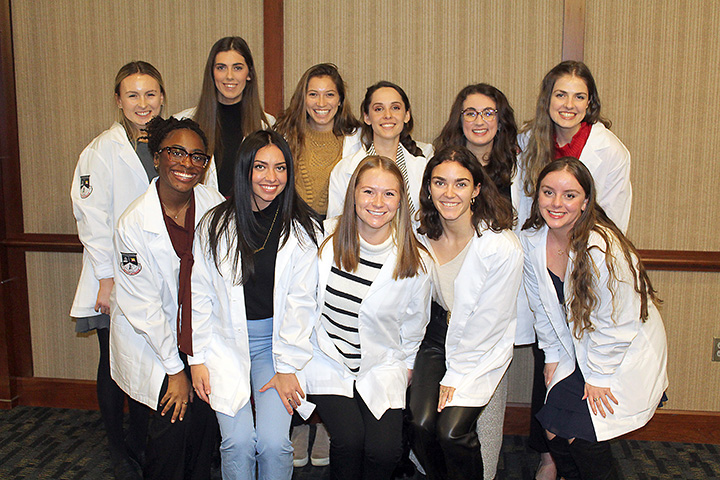
For students in Samford’s School of Public Health, humanity and compassion are part of a balanced dietetic internship.
Samford’s dietetic internship (DI) honored 11 students from the Class of 2023 at a special ceremony Jan. 13, during which the interns were presented with their signature white coats.
“The white coat is a symbol of the health care profession itself,” said Suresh Mathews, chair and professor of the Department of Nutrition and Dietetics. “The white coat signifies humanity and compassion.”
These tenets play a significant and necessary role in health care, Mathews noted, and are central to the DI mission of producing entry-level registered dietitian nutritionists who are resourceful leaders, effectively serving the nutrition needs of diverse persons in their communities with integrity, compassion and respect.
“Many health care professionals see the white coat ceremony as the transition from non-medical to entering the medical field,” said Megan Kaal, DI clinical coordinator. “Putting on the coat helps to symbolize the commission you are accepting. Some white coat ceremonies are held at the end of a program, as a symbol of going out into the workplace as a medical professional. You’re putting on your white coats today in a ceremony that emphasizes our confidence in your ability to become a compassionate and knowledgeable dietician.”
The students also received a special DI patch to remind them of the program’s mission, as they begin their supervised practice rotations.
Admitting her excitement at finding intersections between food and faith, Amy Cameron, instructor and DI director, welcomed the students and reminded them that “food is a reminder for us to be thankful, grateful.”
“We are studying to be dietitians, continuing to learn about nutrition,” she said. “How do we respond to God’s love shown through food?
“First, we need to identify how we are acting/practicing nutrition. Are we acting out of hunger or out of love? Are we people who are desperately desiring to be filled or are we walking in fullness? Second, we need to identify, ‘Whose are we?’ Are we serving the pressures of a hungry world that will never fill us up … or are we those who are created by God and saved by Christ?”
Cameron cited the Lord’s Prayer, emphasizing the significance of “daily bread.” She then quoted author Irene Sun, saying, “The daily-ness of the bread (in the Lord’s prayer) reminds us of the daily-ness of the manna in the wilderness, because God wants us to depend on his provision, his judgment and his mercy every single day.”
In closing, she asked the interns to remember that, as they serve others, they are “doing so for Christ, the great physician, the bread of life.”
The Dietetic Internship Class of 2023 includes:
- K’dayjah Council (MS)
- Amanda Gibbons
- Katy Hewitt
- Taylor North (MPH)
- Lily Miller (MPH)
- Halle Roberto (MS)
- Dayle Rumley (MS)
- Aubrey Sullivan (MS)
- Neely Thomas (MS)
- Mary Kellison Thorne (MS)
- Ally White (MS)
About the Dietetic Internship
The DI is designed to provide the knowledge, practical skills and professional values that meet the standards of education and core competencies for registered dietitian nutritionists, as established by the Accreditation Council for Education in Nutrition and Dietetics.
The internship itself is a 16-month post-baccalaureate certificate program with a minimum of 1,000 hours of supervised practice experiences and coursework to prepare interns for a successful career in nutrition.
Each year, a maximum of 20 interns are accepted into the dietetic internship program, wherein they choose to complete a Master of Science in nutrition (MS) or Master of Public Health (MPH), along with the DI certificate program itself. Students who have a graduate degree may choose to complete the standalone DI, as well.
Once students successfully complete the internship and graduate degree and are validated by the Commission on Dietetic Registration, they are eligible to take the registration examination for dietitians.
To learn more, visit here.
